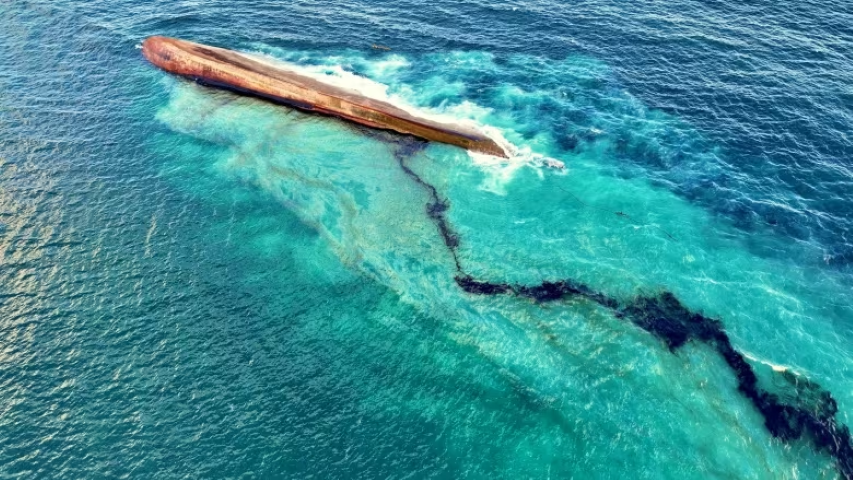
A photograph released on February 10 shows an oil spill on Tobago Island, Trinidad and Tobago. Officials state that the vessel's origins remain uncertain. (Photo credit: Trinidad and Tobago/Office of the Chief Secretary/Reuters)
Trinidad and Tobago, a haven of stunning beaches and vibrant culture, now faces a dire situation that threatens its natural beauty and vital tourism industry. Prime Minister Keith Rowley's grave announcement on Sunday echoed across the nation, casting a shadow of concern and uncertainty.
A sprawling oil spill, ominously swelling near the eastern shores of the twin-island nation, has plunged Trinidad and Tobago into what Rowley termed a "national emergency." The crisis stems from a vessel's calamitous overturn near Tobago's tranquil southwest coast, dousing pristine beaches in a slick sheen of oil.
As the nation grapples with this ecological catastrophe, one haunting question looms unanswered: Who owns the vessel responsible for this environmental tragedy? Prime Minister Rowley revealed on Sunday that the government is still in the dark regarding the vessel's ownership, adding a layer of intrigue to an already murky situation.
The extent of the spill remains shrouded in uncertainty, leaving authorities scrambling to ascertain the magnitude of the disaster. How much oil has tainted the azure waters, and how much lies dormant within the vessel's submerged hull? These pressing questions linger, haunting the minds of officials tasked with containing the unfolding crisis.
Despite valiant efforts by divers, the insidious leak continues to elude containment, exacerbating fears of irreversible ecological damage. Farley Augustine, chief secretary of Tobago's House of Assembly, joined forces with the prime minister to survey the desecrated coastline, bearing witness to the grim reality of the spill's devastation.
For Tobago, a cherished sanctuary for sun-seekers and nature enthusiasts alike, the spill spells disaster for its thriving tourism sector. With oil-coated beaches threatening to deter visitors, officials anxiously anticipate the economic fallout of this environmental catastrophe.
The looming spectre of exorbitant cleanup costs further compounds Trinidad and Tobago's woes, as Rowley conceded that the financial toll of this crisis is yet to be quantified. Despite the uncertainty, offers of aid from undisclosed nations offer a glimmer of hope amidst the chaos, signalling solidarity in the face of adversity.
As Trinidad and Tobago braces for the arduous task of restoration, Rowley acknowledges that the battle against the spill is far from won. However, a semblance of relief permeates the air as favourable weather conditions bolster response efforts, offering a fleeting respite in this tumultuous saga.
In the wake of this unfolding environmental calamity, the resilient spirit of Trinidad and Tobago shines through, underscoring the nation's unwavering resolve in the face of adversity.















